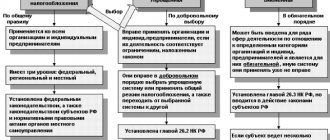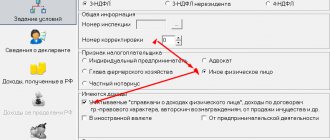2021-05-28 1850
One of the stable sources of replenishment of the country’s budget is the personal income tax, which is paid by residents and non-residents. Essentially, this fee applies to the entire working population of the state, except for certain persons whose income is exempt from personal income tax in 2021.
In this article we will consider the following questions regarding this tax:
- how to determine the rate for calculating personal income tax;
- when is a child deduction provided?
- what are the deadlines for paying personal income tax;
- the amount of the fine for non-payment of personal income tax.
Decoding the abbreviation personal income tax
Here is a breakdown of personal income tax - the combination of these letters means “tax on personal income”. This tax can also be called income tax, as it is withheld from taxpayers’ income.
Taxpayers are residents who receive income both in the Russian Federation and outside the country, as well as non-residents whose source of income is in Russia. More details about who is recognized as residents when calculating personal income tax are stated in clauses 2 and 3 of Art. 207 of the Tax Code of the Russian Federation.
Income tax in Russia
Personal income tax is withheld by tax agents (or paid by individuals themselves) on the following income:
- interest (which is higher than the Central Bank refinancing rate + 5 points, except for interest on government bonds) and dividends received from Russian legal entities and individual entrepreneurs, as well as from foreign companies;
- insurance payments upon the occurrence of an insured event, received by an individual insured from Russian and foreign companies;
- income of authors and owners of related rights, including when using these rights abroad;
- rent (payment for temporary paid use) for property located in Russia and abroad;
- from the sale of real estate, securities and shares in the authorized capital of legal entities, debt receipts of companies and other property; the location of these objects can be both Russia and foreign countries;
- payment for work, services, performance of duties under labor and civil law contracts in the Russian Federation and outside the country;
- scholarships, pensions (except for those paid by the Pension Fund), benefits (except for state ones) received in accordance with Russian and foreign legislation;
- income received during transportation to/from the Russian Federation (as well as at any unloading/unloading points) by vehicles; this also includes the income of the Russian controlling person from the activities of the carrier organization controlled by him;
- rent from the use of power lines, fiber-optic data lines, pipelines and computer networks;
- pension payments received by legal successors for deceased insured individuals;
- other income received by taxpayers in Russia and abroad, with the exception of those listed in Art. 217 Tax Code of the Russian Federation.
For more information about income exempt from income tax, read the material “Income not subject to personal income tax (2015–2016) ” .
Personal income tax formula
Personal income tax is calculated using the following formula:
Tax base × Tax rate.
In this case, the tax base refers to all income (in cash and in kind, as well as in the form of material benefits) of individuals from whom personal income tax is withheld. When determining the tax base, the amounts of deductions (property, professional, social, investment, standard) to which the taxpayer has the right are excluded.
The tax rate for resident taxpayers is 13%, for non-resident individuals - in most cases - 30% (salaries - 13%, dividends from Russian companies - 15%).
The following are subject to a rate of 35%:
- lottery winnings, prizes (except sports), gifts, including from employers, over 4,000 rubles;
- bank interest exceeding the Central Bank refinancing rate, increased by 5 points - on ruble deposits, on deposits in foreign currency - at a rate above 9% per annum;
- savings on interest on loans from consumer cooperatives if their size is less than 2/3 of the Central Bank refinancing rate in rubles (9% in foreign currency).
A reduced tax rate (9%) applies to interest on bonds issued before 01/01/2007. Income from securities is subject to personal income tax at the rate of 30%.
Read more about the current income tax rates in the article “What are the tax rates for personal income tax in 2016–2017?”
December salary payment deadline: options
Employers can choose different options for paying the second part of their December 2021 earnings. So, let’s say, you can pay the second part of your salary ahead of schedule - in December 2021. However, this payment may take place in January 2021. The solution to this issue depends, among other things:
- on the content of employment contracts and internal labor regulations regarding the timing of salary payments;
- from the employer’s desire to pay wages for December 2021 ahead of schedule.
Please note that December 31, 2021 is Sunday, which is a day off in a five-day work week. After this weekend, the New Year holidays will begin. The first working day in 2018 is January 9 (Tuesday). Also see “Salary payment deadlines for December 2021“.
What taxes levied on the profits of individuals reduce personal income tax?
In accordance with paragraph 5 of Art. 225 of the Tax Code of the Russian Federation, the amount of trade tax paid by the taxpayer in the current tax period reduces the amount of personal income tax for the same period. In order to exercise this right, an entrepreneur must notify the Federal Tax Service about his registration as a payer of the trade tax in relation to the object of his business activity.
personal income tax by a foreigner employed in Russia reduces the amount of income tax withheld from him. Such an employee submits information about payment for the patent to his source of payments, and the tax agent adjusts the amount of personal income tax from the taxpayer’s income by this amount.
New sanctions if the deadline for paying personal income tax on wages is not met
If a company should have, but did not, withhold tax, then, according to the current version of Article 123 of the Tax Code of the Russian Federation, the tax inspectorate will charge it a fine in the amount of 20% of the amount not withheld or not transferred. In addition to the fine, the organization may also be charged penalties in accordance with paragraph 1 of Art. 75 of the Tax Code of the Russian Federation. Penalties are calculated based on the Central Bank key rate in effect at the time the debt arose in the following amounts:
- for individual entrepreneurs - 1/300 of the Bank of Russia key rate, regardless of the duration of the delay;
- for organizations: 1/300 of the key rate - for the first 30 days of delay;
- 1/150 of the rate - for each day, starting from the 31st day of delay.
The authorities are happy with such sanctions. However, the Constitutional Court, in Resolution No. 6-P dated February 6, 2018, indicated that the Tax Code of the Russian Federation needs to clarify the rules when a taxpayer can be released from liability for failure to pay personal income tax on wages or money paid under other agreements. Therefore, officials had to develop amendments to Art. 123 of the Tax Code of the Russian Federation, which provide the following clarification:
A tax agent is released from liability under this article if he submits to the tax authority within the prescribed period a tax calculation (tax calculation) containing reliable information, in the absence of facts of non-reflection or incomplete reflection of information and (or) errors in it, leading to an understatement of the amount of tax subject to transfer to the budget system of the Russian Federation, and this tax agent independently until the moment when he became aware of the discovery by the tax authority of the fact of untimely transfer of the amount of tax or the appointment of an on-site tax audit for such tax for the corresponding tax period, are listed to the budget system of the Russian Federation the amount of tax not transferred within the prescribed period, and the corresponding penalties.
Thus, there will be no fines for non-payment of personal income tax if several conditions are met simultaneously:
- the company independently discovered the errors before the tax authority identified them;
- previously unpaid amounts are transferred to the budget, and along with them penalties;
- the reporting contains only correct information.
Tax accounting personal income tax
All tax agents are required to charge personal income tax , withhold it from the income of individuals and pay it to the state budget in accordance with Art. 226 Tax Code of the Russian Federation. Personal income tax is withheld when calculating wages or paying other income. The amount of deductions for personal income tax should not exceed an amount equal to half of the paid income (clause 4 of article 226 of the Tax Code of the Russian Federation). At the same time, payment of personal income tax at the expense of personal funds of tax agents is not allowed (clause 9 of article 226 of the Tax Code of the Russian Federation).
personal income tax payments by tax agents to the budget are made on the working day following the payment of income, and for sick leave and vacation pay - no later than the last day of the month in which such payments were made (clause 6 of Article 226 of the Tax Code of the Russian Federation).
Accounting for the income of individuals at the sources of their payments (tax agents) is carried out using tax registers, which systematize information during the tax period. The forms of such registers are independently developed by tax agents; in this case, it is mandatory to have all the data identifying the taxpayer - the recipient of the income, as well as all information about the income received (amount, date, type of activity) and codes of applied tax deductions (clause 1 of Article 230 of the Tax Code of the Russian Federation ).
Taxpayers listed in paragraph 1 of Art. 227, paragraph 1, art. 227.1 and paragraph 1 of Art. 228 of the Tax Code, income tax independently. Payment of self-assessed personal income tax is made no later than July 15 (clause 4 of article 228 of the Tax Code of the Russian Federation). Individual entrepreneurs and self-employed persons pay income tax in advance by July 15 for the first half of the year, by October 15 for the 3rd quarter, and by January 15 for the 4th quarter.
To learn about which BCCs are used when paying personal income tax, read the material “New BCC codes for personal income tax for 2016–2017.”
Who can pay personal income tax later?
The standard deadline for paying personal income tax at the end of the year is July 15 of the following reporting year.
For small and medium-sized businesses from the most affected industries, the deadline for paying personal income tax on entrepreneurs’ income for 2021 has been postponed by 3 months, that is, until October 15, 2021.
If you do not operate in the affected industries, the deadline for paying personal income tax for you remains the same - until July 15, 2021.
We are talking about personal income tax, which individual entrepreneurs pay from their income, but not personal income tax, which tax agents must transfer from payments to employees. Personal income tax from salaries for April can be transferred after the end of the non-working period, that is, on May 12, if the organization did not work during the “presidential holidays” by decrees of the President.
What is the priority of personal income tax payments in 2016–2017?
When preparing payment orders for personal income tax in 2016-2017, you should be guided by the current rules for filling out such documents. The rules for indicating the necessary information about the payer and recipients of funds when paying personal income tax in 2016-2017 are contained in Order of the Ministry of Finance dated November 12, 2013 No. 107n, which should be applied in the current version.
When making an income tax payment in 2016–2017 , in the “Payment order” column of the payment order, enter the value “5” if we are talking about planned deductions. Explanations on this issue are given in the letter of the Ministry of Finance dated January 20, 2014 No. 02-03-11/1603, which provides a reference to the changes that have occurred in civil legislation. In accordance with these changes, now personal income tax made by banks on tax payment orders have a priority of “3”. And personal income tax carried out as planned by tax agents (taxpayers themselves) have a priority of “5”.
Income tax in the Russian Federation on advance payment
When paying an advance payment to an employee on salary, the employer - tax agent does not withhold personal income tax , since withholding personal income tax is possible only at the end of the month when wages are calculated (clause 2 of Article 223 of the Tax Code of the Russian Federation).
For more information about why personal income tax is not withheld from an advance, read the article “Do I need to pay personal income tax on an advance and when?” .
As for the bonus paid in advance, this rule does not work here, since the bonus is income recognized according to other rules (subclause 1, clause 1, article 223 of the Tax Code of the Russian Federation): on the date of actual payment. This means that, having made a partial payment of the premium in advance earlier than the agreed period, the tax agent must withhold and transfer personal income tax to the budget.
If the advance payment is provided for in a civil contract with an individual, then with such payment the tax agent must also withhold personal income tax .
What the Labor Code says about wages for December
If the deadline for paying wages for the second half of December is set from January 1 to January 8, 2021, then the employer is obliged to pay employees for December no later than December 29 (Part 8 of Article 136 of the Labor Code of the Russian Federation). It is simply impossible to issue salaries in January 2021 in such a situation, so as not to violate the requirements of the Labor Code of the Russian Federation.
Note that before paying wages, the employer must first close the time sheet and only then calculate wages. This logic follows from Part 4 of Article 91 of the Labor Code of the Russian Federation. If so, then it would be correct to accrue December salaries only in January 2021.
But, as we have already said, employees may need to pay wages in advance, since the payment deadline falls on weekends and holidays (Part 8 of Article 136 of the Labor Code of the Russian Federation). If you pay the second part of the salary for December later, the employer faces an administrative fine of up to 50,000 rubles. (Part 6 of Article 5.27 of the Code of Administrative Offenses of the Russian Federation). Thus, there is some uncertainty in labor legislation. On the one hand, you need to wait until the end of the month and close the timesheet, and on the other hand, you need to make the payment before the end of the month.
In our opinion, if the payment deadline falls from January 1 to January 8, 2021, then the salary for December 2017 must be calculated and paid in December. Moreover, you don’t need to wait until December 29, 2021. Of course, it is possible that in the last days of December workers may get sick or even miss work. And then an overpayment occurs. However, accruing and paying wages before the end of December will be better than being subject to the above-mentioned administrative fine of 50,000 rubles. Moreover, for late payment, the employer may be required to pay monetary compensation to the employees.
We also note that, at the initiative of the employer, it is possible to pay wages for December 2021 ahead of schedule. However, in this case, it will be necessary to issue an order for early payment and familiarize employees with it. See “Order on early payment of salaries for December 2021.”
Personal income tax in 2016-2017
Personal income tax in 2021 has undergone a number of regular changes, the most significant of which are:
- appearance of quarterly reports on tax amounts accrued and paid for the reporting period;
- changing the conditions for exemption from taxation of income from the sale of real estate acquired after 01/01/2016;
- providing deductions for treatment and on-the-job training;
- an increase (up to 350 thousand rubles) in the amount of income up to which the employee has the right to receive a child deduction;
- increase in the amount of deductions for disabled children;
- introduction of a single deadline for paying personal income tax on income (no later than the working day following the day of payment) with the exclusion of sick leave and vacation pay;
- clarification of dates for receipt of certain types of income (travel allowances, offset of counterclaims, debt write-off, financial benefits);
- change in the direction of increasing by 1 month the period for submitting to the Federal Tax Service information about the impossibility of withholding personal income tax from paid income;
- establishing a new deadline (December 1 of the following year) for an individual to pay tax not withheld from him by a tax agent.
For information on the rules for issuing a certificate of unwithheld income from an individual, read the material “Reporting about unwithheld personal income tax - sample certificate 2-NDFL.”
The 2017 innovations regarding personal income tax , which came into force from the beginning of the year, did not differ in such variety:
- a fee for an independent assessment of his qualifications, paid by the employer, has been added to the employee’s non-taxable income;
- the list of deductions available to an individual is supplemented by a fee for an independent assessment of qualifications, which the person paid independently.
Innovation No. 3. Introduction of new codes for the 2-NDFL certificate
In the coming year, two codes will appear designed to reflect certain types of employee income. This means changes to 2-NDFL from 2021. The new designations are:
- 2002 – bonuses that are related to the employee’s performance and become part of the specialist’s salary.
- 2003 – bonuses paid from the organization’s net profit.
Previously, for the two types of payments given, the code “2000” was used - remuneration received for the performance of official duties.
An issue that will undergo significant adjustments from January 1 is personal income tax deductions in 2021. What changes is the legislator preparing?
Changes affect standard deductions. New codes have been introduced for them:
- 127 – for the first child to parents (adoptive parents);
- 127 – for the second parents (adoptive parents);
- 128 – for the third and other parents (adoptive parents);
- 129 – for a child with a disability of group I or II to parents (adoptive parents).
Additionally, codes 130-133 are used. They are used to reflect tax benefits provided to guardians and adoptive parents. The principle of using values is similar to the one above.
Changes to 2-NDFL 2021 did not affect the rules for providing deductions. As before, before the child reaches adulthood, they are provided in all cases, after - depending on the fact of continuing education. If the child continues his studies at a university, his parents will enjoy the benefit until he turns 24.
The salary “ceiling” for receiving a standard deduction in 2021 is 350,000 rubles. If the parent's income exceeds this amount, he loses the right to the benefit. It disappears when the child dies, turns 18, and graduates from college. In all of the above situations, the deduction ends on January 1 of the following year.





